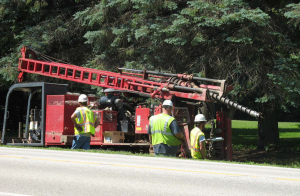Highway robbery? WI DOT spending $16 million to fix $8K road problem, group says

By Adam Tobias | Wisconsin Reporter
VILLAGE OF RICHFIELD, Wis. – Denise Kraetsch could lose her family farm if the Wisconsin Department of Transportation is allowed to proceed with a rural highway project in Washington County.
HIGHWAY ROBBERY?: A crew under contract with the Wisconsin Department of Transportation collects soil samples in July 2013 near Highway 164. A citizens group says the proposed highway rehabilitation project is a waste of millions of taxpayer dollars.
But the potential effect on taxpayers could be even more significant.
The DOT wants to spend more than $16 million to improve a 7.5-mile stretch of State Highway 164 running through the Village of Richfield and the Town of Polk.
But a grass-roots organization that has been fighting the project for more than a decade says the DOT could accomplish the same goal for $8,000, by simply reducing the speed limit from 55 mph to 45 mph.
“The question we’re asking is: Why are they trying to spend $16 million to fix an $8,000 problem?” Jeff Gonyo, a member of the Highway J Citizens Group steering committee, told Wisconsin Reporter. “That’s government at its worst.”
Gonyo and his neighbors filed in federal court a preliminary injunction against the U.S. DOT, Federal Highway Administration, Wisconsin DOT and U.S. Army Corps of Engineers. It’s an attempt to further block the agencies from expanding the two-lane road.
The DOT says the $16 million project is needed to create turn lanes at most intersections, improve sight distances and relieve traffic congestion at Holy Hill Road.
To do that, the transportation department intends to spend $1.7 million in taxpayer money to buy 44 acres. Kraetsch and her ancestors have owned about five of those acres since 1859.
Kraetsch said she might be forced to sell her 88-acre farm because the loss of “prime land” would cut deeply into profits.
“That’s something my husband and I have been throwing around … It’s very saddening,” she said.
In addition to giving up productive farm land, Kraetsch would have to move her driveways, probably over her septic tank or her new, $14,000 water well. That layout would make it harder to farm, Kraetsch said.
The plan also calls for creating a 2-acre retention pond on the Kraetsch property.
The citizens’ group is arguing the highway project violates U.S. Judge Lynn Adelman‘s rulings in 2009 and 2010 that essentially stopped all work because of an inadequate environmental impact study.
Adelman decided the government entities did not hold proper public hearings, failed to consider reasonable alternatives and did not provide a complete review of environmental consequences.
The state DOT is drafting a new environmental report for the project, which includes widening the highway’s lanes and shoulders and installing a roundabout, according to Mike Pyritz, a DOT regional communications manager. A public hearing is scheduled Thursday.
But members of the Highway J Citizens Group say the DOT and its contracted companies already started preparing for the undertaking last year by surveying private land and taking soil samples.
Metropolitan Appraisal LLC sent letters to residents asking that their employees be allowed to inspect all affected properties. The company also was seeking to look through homes that wouldn’t be altered in the proposal.
“I don’t know why they need to be so invasive,” Kraetsch said.
But Gonyo believes the traffic safety danger can be alleviated if the DOT agreed to lower the speed limit to a uniform 45 mph.
The segment of Highway 164 has a crash rate 67 percent higher and an injury rate 23 higher than the state average for rural, two-lane highways.
But accidents on Highway 164 decreased by almost 80 percent in 2000 during five months of construction; the speed limit was reduced to 45 mph, according to an investigation by the Washington County Sheriff’s Office.
Ayres Associates, which was hired by the DOT, also recommended in 2007 that the state conduct a one-year evaluation of lowering the speed limit.
Some DOT officials seemed on board with that advice, according to emails obtained by Wisconsin Reporter.
“This is an excellent and extremely comprehensive report,” former DOT engineer Phil DeCabooter wrote to several of his colleagues in July 2007. “At the very least, it should build a strong case for a uniform 45 mph speed limit along this route.”
The DOT agreed to set a 45 mph speed limit starting Nov. 1, 2007, but it went back on that arrangement after spending additional tax dollars on another study from Opus International Consultants, which supported raising the speed limit to 60 mph.
The DOT eventually decided to keep the speed limit at 55 mph.
After Adelman’s 2009 ruling, Gonyo said, his phone was “ringing off the hook” for four straight months. The calls came from volunteer organizations from throughout Wisconsin having similar issues with the DOT.
“This agency is long overdue for serious reform,” Gonyo said. “We have rows and rows of desks of DOT engineers … it seems like all they’re trying to do is dream up projects to keep themselves busy so they don’t lose their job.”
Contact Adam Tobias at atobias@watchdog.org or follow him on Twitter @Scoop_Tobias
The post Highway robbery? WI DOT spending $16 million to fix $8K road problem, group says appeared first on Watchdog.org.







